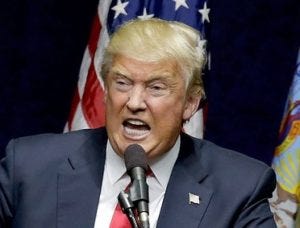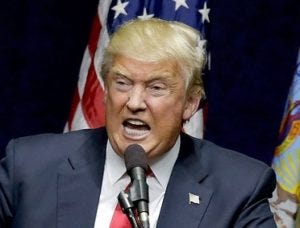
One of the more amusing aspects of this election, for me personally, has been the daily reading of spirited political arguments on Facebook between a buddy of mine and his elderly father.
Like me, my friend is a conservative thinker who has long voted Republican, but he can't bring himself to cast his ballot for Donald Trump, primarily due to character issues. His father is a far-right guy who didn't vote for McCain and Romney because he believed they were too liberal. However, this year, he's a fiercely loyal Trump supporter who reflexively (and aggressively) rationalizes every controversial, contradictory, and dishonest statement that comes out of his candidate's mouth.
Every day, the two go back and forth like Eugene Tackleberry's in-laws from the Police Academy movies, taunting each other and landing wicked punches. The father (whose posts often end up deleted for excessive swearing) calls his son an idiot, and accuses him of aiding the enemy (Hillary Clinton). The son calls his father a hypocrite, and blames him for helping to nominate an unelectable candidate.
I used to step in from time to time, but the father blocked me after I kept thanking him for supporting a pro-gay rights candidate (he doesn't like to acknowledge that about Trump).
Though entertaining, the exchanges aren't all that different than the mud-slinging you often see on Twitter, and in the comment sections of political websites. The Political Right is engaged in a very real battle right now, and it's not pretty.
One of the more notable declarations the father has been making over the past several months, is that if Trump loses in November, there will be a "civil war" in this country. I initially thought that he was using the term metaphorically, but that wasn't the case. He truly believes that Americans will organize into two factions, take up arms, and turn the country into a literal battlefield.
"You'd better choose sides right now!" he's warned his Facebook friends.
His belief is that a November loss for Trump simply isn't a plausible outcome — not if the election is free and fair. Such a result would have to come from an artificially manipulated system (similar to how he views the national polls that typically show Trump losing). And if the system has become obsolete, citizens would have no choice but to fight to win back their country.
Sadly, it's a spreading belief. I hear this type of stuff, in response to my online commentary, fairly often. The people who share such sentiment are emboldened by the likes of Alex Jones, and the shift of popular conservative websites (like the Drudge Report and Breitbart) to more conspiracy-driven content.
Yes, it's crazy-talk, and no, there won't be a civil war. But when you add to the mix a conspiracy-pushing presidential nominee (one with a very loyal following), who's telling the world that the U.S. election is indeed "rigged," you're potentially looking at a very dangerous situation.
No one's arguing that the media isn't biased. Of course it is, and the clear beneficiary of that bias, for many decades, has been the Democratic party. No one's arguing that voter fraud doesn't exist in this country. Of course it does. There have been local-level reports of it over the years, and each case should be aggressively pursued. The notion, however, that the national election is somehow being "rigged" against Donald Trump (or anyone for that matter) is painfully absurd.
Regardless, that narrative is sinking down into the electorate. The topic is being discussed regularly on the news networks, and even people I know well (and generally consider to be levelheaded) are posting social-media links to fringe web-articles that portray the system as a fraud.
For as often as people mock Trump, it's important to note that he is an iconic, deeply influential figure in this country. He received over 13 million votes in his party's primary. His words hold weight. He has a lot of power, and he is choosing to use that power to put forth the message that America's representative democracy is being hijacked.
What he's doing is incredibly reckless.
Sure, Trump is putting on this little performance to avoid having to accept personal blame for a likely November loss, but a lot of his supporters don't understand that. They've invested a tremendous amount of faith and passion in their candidate, and they still hang on his every word. They think he's a truth-teller.
I would hope that the GOP nominee would actually take a few minutes to think about that, and ponder what freedom-loving Americans (even in very limited numbers) might be willing to resort to, if they were truly convinced that his election loss would mark the end of American independence as they know it.
I would also hope Trump understands that he could neutralize that kind of angst quite easily and effectively, with just a few responsible words in a concession speech, should he have to deliver one on election night.
It would give him a parting opportunity to show (as he's been saying) that he cares more about the country than he does his own brand. Would he actually take that opportunity? I'm not convinced.











